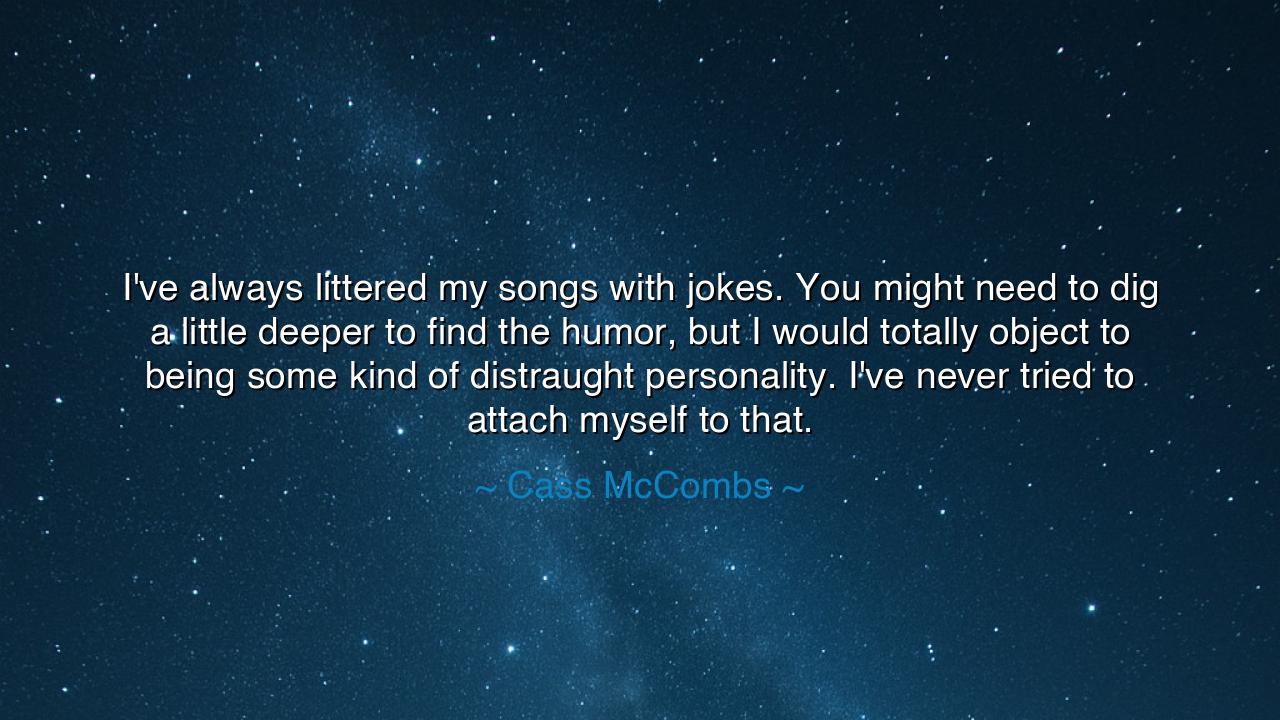
I've always littered my songs with jokes. You might need to dig a
I've always littered my songs with jokes. You might need to dig a little deeper to find the humor, but I would totally object to being some kind of distraught personality. I've never tried to attach myself to that.






In the vast theater of life, where every soul plays its part, there exists an understanding that humor and sorrow are often intertwined, like two sides of the same coin. The ancients knew well that the human condition was one of both struggle and laughter. As Cass McCombs so aptly reflects, "I've always littered my songs with jokes. You might need to dig a little deeper to find the humor, but I would totally object to being some kind of distraught personality. I've never tried to attach myself to that." In this, McCombs speaks not just of his music, but of a deeper truth that all who walk the earth must face—the choice to navigate the storms of life with grace and humor, rather than with despair.
From the beginning of recorded thought, there has been a recognition of the delicate balance between joy and sorrow. Sophocles, the great playwright, understood this intimately. In his tragic works, he often depicted the plight of humans caught between their desires and fate, yet even in the darkest of moments, there would often be a glimmer of humor—a jester’s insight or a twist of irony. For McCombs, humor is a salve that lightens the burdens of life. His songs, filled with jokes that may take some time to uncover, reflect a truth that we cannot fully understand the depth of the human spirit unless we acknowledge both its pain and its joy. McCombs does not shy away from the complexities of life, but he adds a touch of lightness, reminding us that humor, when found in the depths of the soul, can be a path to clarity and understanding.
Consider the wisdom of Marcus Aurelius, the Stoic philosopher-emperor, who, in his moments of deepest contemplation, often wrote with an eye toward the absurdity of life. He did not dwell solely on the heavy aspects of existence but saw, with a sharp and clear eye, the ironies of human nature. His writings are filled with a kind of dry humor, an understanding that, despite the many tribulations of life, one must still find the space to laugh at the follies that we, as humans, often display. McCombs shares this perspective. He does not attach himself to the idea of a “distraught personality” because he recognizes the paradox—that sorrow, while real, is not the whole of life. It is a single thread in a tapestry that is far richer and more varied, woven together with moments of lightness, joy, and, yes, humor.
In the same way that Aristophanes used comedy not merely to entertain but to provoke thought and reflection, McCombs uses humor to illuminate. The ancient Greek playwright did not simply make fun of society for the sake of laughter; his comedy was a mirror, reflecting the absurdities of political and social life. McCombs, in his own way, mirrors the human experience—a blend of light and dark, of beauty and struggle, where the laughter is often hidden beneath the surface. To call his work merely lighthearted would miss the point—it is nuanced, and its humor serves to deepen the message, to add layers to the experience. It is through this balance of wit and wisdom that both Aristophanes and McCombs invite their audience to look beyond the obvious, to seek deeper understanding.
There is a profound lesson in McCombs' words. Life is not about clinging to a single identity or being confined by one emotional state. He teaches us that while there is room for grief and sorrow, there is also room for laughter and lightness. The ancients understood that life’s complexity requires that we do not let ourselves be defined by any one emotion. To be a whole person is to embrace both joy and sorrow, to understand that one does not negate the other. McCombs’ refusal to allow himself to be reduced to a “distraught personality” is a call for us all to embrace the wholeness of the human experience, to see humor not as trivial, but as an essential tool for endurance.
Let us take this lesson into our own lives, for it is easy to become overwhelmed by the weight of our experiences, to allow the sorrow of the world to become our sole identity. Yet, in this, we lose the ability to see the deeper truths that lie beneath the surface. We must seek out humor, not as a way to escape reality, but as a means to understand it. Let us not cling to sorrow, but instead balance it with the wisdom and laughter that arise when we can see the absurdities in life with clarity. Like McCombs, let us find ways to inject humor into our struggles, to laugh at the contradictions of our existence, and to remind ourselves that we are not defined by our hardships, but by how we rise above them.
In the end, let us be like the ancients who understood that true wisdom lies not in ignoring the complexities of life, but in embracing them fully—recognizing that humor, like sorrow, is a universal part of the human experience. Let us live fully, not as victims of circumstance but as participants in the great comedy and drama of life. Through this, we will find not just understanding, but peace—a peace born from the balance of light and dark, of joy and grief, of wisdom and humor. This is the essence of being human, and it is through this balance that we find the strength to continue our journey.






AAdministratorAdministrator
Welcome, honored guests. Please leave a comment, we will respond soon